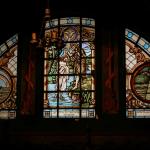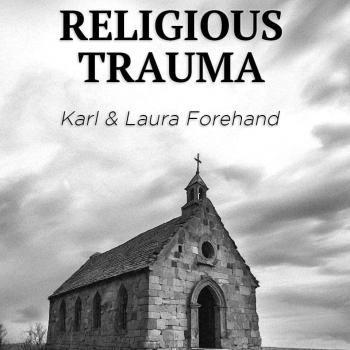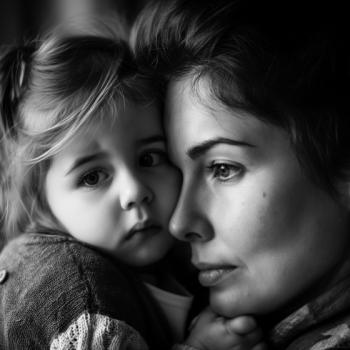New Lenses – My Story – Karl Forehand
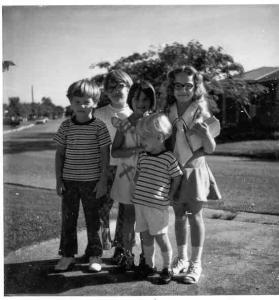
The first time I remember understanding something about God was when my mom took me to a large Baptist church in the Oklahoma City area. I was beyond shy most of my life, but that day, I told my mom I wanted to walk the aisle because the preacher had convinced me that I was sinful enough that God did not want anything to do with me. My only option to avoid eternal conscious torment was to strike a deal with God himself and I could do that right here in this very establishment.

Looking back, I cannot recall anything significant I could have been doing at age seven that would make God despise me that much. I learned to sin in a more significant way later when I started attending a private, Christian school. I could understand how God would be a little perturbed with me at that point, but I never really understood why he or my parents were so upset. I was adventurous and a little mischievous, but surely that did not surprise God.
My understanding was that he created me and orchestrated the system under which we were operating. He must have known that I would fail at this impossible task of being holy. Much like my attitude toward my parents, I often wondered why everyone was getting so worked up. Although I did not understand much of anything about God, sin, or holiness, I went along with the established program and baptism a week later.
About a year later, we moved to a suburb of Oklahoma City when my dad got a new job at a lumberyard. With this move, we no longer lived in the inner city and could now enjoy all the good fortune of suburban America in the early seventies. Within a year, we were attending a fundamentalist, evangelical church that also had a private school. For the next five years, we fully experienced what I now see as much of the damaging programming in my life.

If you are a former evangelical, you can imagine what it was like, but let me give you a few examples. One of the favorite revival preachers at this church was Jack Hyles. He is the guy who sanctioned his son to beat the neighbor boy “bloody” for insulting his sister. I remember them being very into spanking, and belts were a common appendage for the untrained nursery workers at their busy childcare facility. My response to all this was to rebel and it just really hardened me. Being adventurous, I spent most of my time outside trying to avoid any contact with the leadership. My dad was not around much, and my mom tried to discipline us, but it did not work.
Subconsciously, I knew I did not want what they were selling even though I had to attend Bible classes all the time. Our Sunday School did Bible drills and rewarded us for answering Bible questions with candy. When I did not do so well at this, I learned to steal candy from the convenience store across the street. I learned all kinds of habits there like chewing tobacco, how to get away with stealing, and how to beat up anyone that ratted me out.
My view of God at that time was that he was incredibly angry. We were never going to be good enough, so I felt checked out through junior high. I was trying to see what I could discover on my own. I discovered tobacco and stealing and what it felt like to kiss a girl. I felt the exhilaration of outfoxing the teachers and my parents. I do not remember hating God or my parents, I just did not want what they were selling.
It is important to remember that even though I did not ascribe to the beliefs of that era, it was still the only base view of God that I had. So, I proceeded into the next phase of my life with that implanted view of spirituality.
The lumberyard owner gave my dad a job in a more rural part of Southwest Oklahoma. One of my dad’s affairs happened there, but we were not aware of any of that until later. In many ways, rural life is simpler, but in other ways, it is much more intense. At the suburban junior high, nobody knew when I got caught stealing; but everyone in town was aware that I stole a cassette tape on the first field trip in the new, small town. The shame was almost unbearable, not to mention the physical pain from the paddling at school.
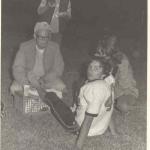
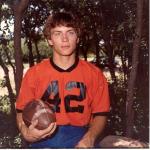
I learned how to work hard in the rural setting by going on wheat harvest when I was fifteen. My fighting skills from private school came in handy when a much older man challenged me to a duel of sorts. The boss later fired all the workers for getting drunk and neglecting their duties. Again, my private school training paid off and I participated, but I just slithered out of it, and I got to drive one of the pickups home illegally.
I did not think about God much during those years. We attended a Baptist church where the father of one of my friends was the pastor. I remember coming to respect him more for his gentle way and the carvings that he did in the garage. His son and I taught each other how to drink hard liquor. We shot birds out of the tree next door with a pellet gun and my view of God adopted a bit of grace that I had never seen before. Again, I do not remember any details, but the man behind the pulpits showed me a different vision of holiness that seemed more reasonable. Jack Hyles and his son ended up in all kinds of legal trouble.
I decided to attend a technical school about 4 hours from home. It seemed like my ticket out of the small-town prison I imagined myself to be in. I do not remember even thinking about God as I found myself among some of the roughest characters I had ever imagined. There were Black people from the South side of Chicago, delinquents from the inner city of Tulsa, and Native Americans who were about as raw as anyone I had ever met. I remember a certain pickup basketball game characterized by the phrase, “No blood, no foul.” The only religious group on campus was the Fellowship of Christian Athletes who occasionally were robbed by students of their weekly offering.
I only got into one fight at the Tech school mainly because the stakes were higher. The whole experience made me stronger, and I learned to appreciate diversity a little better, but religion and theology were absolutely one of the lowest of my concerns.
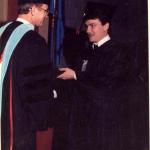
My first job was in the Dallas / Fort Worth area where I worked the night shift in a data processing facility owned by Ross Perot. The next few years were a whirlwind of experiences where I cared little about anything except progressing in my career and finding enough money to party and pursue females every chance I got.
Within two years, I met Laura, and we were married even though neither one of us was ready for it. Suddenly, I felt the need to ground myself instead of just living for the next time I could experience the Dallas, Texas nightlife. I started to think about raising a family and what I would teach them, and my mind returned to spiritual things.
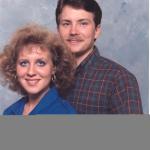
At some point, I wandered into a small church where I lived and experienced something that impacted me. Suddenly, I felt like I understood unconditional love. No one in the church talked to me and I never went back, but I remember feeling love very deeply somehow. The high school pastor guy, Bill, showed me grace and, in this small church, I learned about love. That was the extent of my momentous spiritual experiences for the first 23 years of my life.
After that, I would wander into various churches where I discovered things like a 100-voice men’s choir, in an all-Black church, which moved me and slowly I would experience preachers that would spark something in me. It was an odd mixture of memories from the past and thoughts about the future man I might become. It was guilt and shame and unprocessed trauma that somehow allowed the sales pitch to reach its mark and soon I found myself teaching Sunday School to a group of seventh-grade boys.
We were involved for a couple of years in a multi-level marketing adventure that involved a weird cult-like mixture of greed, capitalism, politics, and fundamentalist Christianity. When we moved to Omaha and got away from the group’s influence, we settled into the only thing I knew the best, a Southern Baptist church. There was no soul searching or deep intellectual consideration—it was just what I knew the best and what I thought I wanted for my wife and my only son.
In most churches, it is a given that people will get involved. It is what makes the organization run. Eventually, I would become a deacon and youth leader. I started working on my bachelor’s degree from a Christian seminary in town which very quickly led me to believe God called me to be a preacher. The school and my church slowly chiseled my view of God. I learned to defend the doctrines of conservative evangelicalism. Some of this troubled me, some of it resonated with me and some of it even wounded me.
The pastor who licensed me told me I had a lot of zeal. I do not think he meant it as a compliment. The church needs reform and I think, in some ways, that is why I became a pastor. I wanted to make it into something the younger folks could relate to, but I accepted its doctrines as they were handed to me. We have a problem, God solved the problem, and we must accept the solution. After that, it gets complicated and messy, but if you try hard you can learn to bypass most of the messiness and at least give off the appearance that everything is okay.
For the next 20 years, I pastored three churches. All of them were successful. I was exceptionally good at blending into a community and bringing my love and grace messages to smaller communities mostly in rural areas. All of them were happy with me and we enjoyed some great times, along with some traumatic inevitabilities of that type of ministry.
There were nagging questions and doubts, but religious platitudes and the swirl of activity that surrounded the ministry bypassed them. Toward the end of my final pastoral experience, I began to permit myself to ask questions. I assumed that God could handle my questions and it should be okay to inquire. As I pursued the questions, my understanding changed and eventually led me to conclude that pastoring a church and examining your faith deeply did not mix too well.
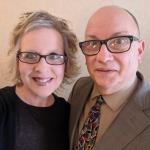
After almost 20 years in ministry, I resigned from my last church and began what I would call my deconstruction. Several of my beliefs started unraveling. I started moving toward universal reconciliation and openness to all people. I entertained so many thoughts, but I did not have a systematic approach to follow. I met Brian Zahnd, and he encouraged me to stay on the journey. I needed some kind of approach to follow, and I eventually found it.
At the time, I viewed God a lot more anthropomorphically. I understood God to be Father, Son, and Spirit, and imagining HIM in human terms made sense when I imagined what He was like. Because I understood this to be my basic framework, I decided to draft a book and evaluate my beliefs about God the Father based on my experience as a father. It started when I watched the scene from The Shack where the main character confronts the dilemma of sending one of his children to eternal damnation. Because he could not do it and I knew I could not do it, I wondered how God could either. God cannot be a worse father than me!
Writing the book, Apparent Faith: What Fatherhood Taught Me About the Father’s Heart, challenged my views of separation from God, election, nationalism, and many more. It is a simple, easy-to-read book, but it was the framework for challenging everything. God cannot be worse than me, he cannot be more retributive, and he cannot have a worse temper than I do.
The exercise left me with less certainty, but more peace. I had fewer rules to follow, but I was living a better life. I became increasingly determined to face my trauma. I saw the Bible much less literally and began to open to the many ways the Divine speaks to us. Also, with the idea of universal reconciliation, I began to catch the notion that God is in everything.
Several of my friends participated in a program taught by Benedictine Sisters. It was training to be a spiritual director, which is just a good listener that helps people process their trauma and go inside for their spirituality. They call themselves “Contemplative Companions.” It was eye-opening in many ways, but one specific thing said by one of the sisters still resonates with me. She said, “None of us is right.” Understanding that, and letting go of my need to be right, opened me up to so much more discovery. The more I know, the less I know, or something like that.
I was learning a process called centering prayer where you do not ask or expect anything, but you just sit quietly and be present. Along with meditation, I was learning to be still and experiencing new revelations that might be what some call, “hints and guesses.” When Sister Marcia suggested I visit a local forest, I found a spot in the mystical place and sat down with this wonderful piece of nature.
After listening to a Native American song, I realized vividly that “I am a part of this, and this is a part of me.” It was revolutionary in my understanding of God, The Divine, Source, or whatever you want to call it. I realized that God is in all things, and everything connects on a deep level.
Later, I would think soberly about nature. When I grew sprouts in my kitchen, I would think about how a tiny seed contains all the magic to create a tiny broccoli plant. All the intelligence, food, and information to make a plant resides in the seed. Scientists tell us that most of an atom is space. I wonder if it is empty or is this the spirit that we call God?
Many of my friends these days talk about their experience with self-actualization. They are beginning to go inside themselves and find healing, and some deep truths that have eluded them before. What they find there is self-worth that was often damaged or covered up by religious activities. As they learn to trust their true self and their inner wisdom, they come to realize that they are all divine beings. This expresses itself in unusual ways—it is new and ancient wisdom at the same time. They talk of “pure, unconditional, judgment-free love,” and learning to trust themselves instead of a book, a creed, or a system.
I join with them in affirming that a part of me is divine and that God may be in every part of me, not just a certain space. I now understand that I can trust my feelings and emotions because they are trying to communicate with me, especially about the trauma I have experienced. I understand when they say, “I am God,” because they are talking about essence and things that are difficult to articulate. Some people say that just like my kids are Forehands, we are gods because we are children of God. But that understanding is still anthropomorphic and could limit our understanding. So, let us move on for now.
The distinction I would like to make at this time is that all of us, including God, seem to have an isness that is unique. It is very possible to describe God as the source, and we are all from the same origin, but it makes sense for me to realize there is a uniqueness about each of us that is distinctive enough to recognize. For me to have a true self, my self must be unique enough to separate me at least slightly from everyone else, including God, Source, and Divine.
So, what is my relationship specifically with God? I am glad you asked because this is the lens that I want to examine in detail. I want to put everything under this microscope. With everything we are learning about subatomic particles and quantum physics, it is much more complex and somehow, much simpler. Maybe everything is spiritual, maybe everything is connected, and possibly everything emanates from one source. This leads me to a thought I don’t know how to process: I am OF God.
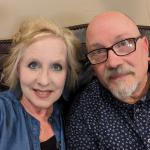
I do not know if I can say that I am a Christian anymore. I do not want to be an atheist, agnostic, or even a done or none. None of the labels fit me anymore and even the terms I like, such as mystic or contemplative, connect to dogmatic realities in different religions.
More than anything else, I like this fresh lens to examine the concept of myself as a unique being questioning the idea of my being OF God. I am totally and completely uncertain where this journey of discovery will end up. I do not have a point to prove or a dogma to confirm. I am starting with a phrase and examining what I am discovering as I journey forward.
I invite you to join me as we journey and discover and question everything.
Be where you are, Be who you are, Be at peace.
Karl Forehand
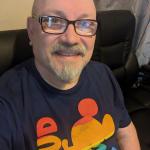 About Karl Forehand
About Karl Forehand


